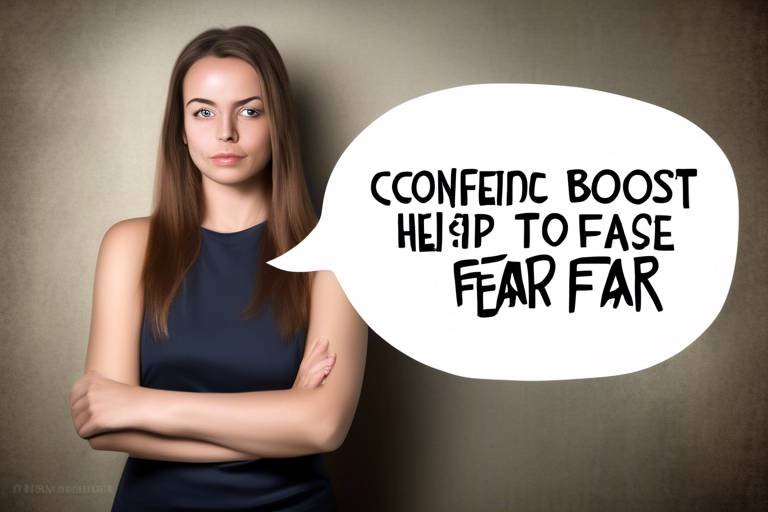Can Confidence Overcome Fear?
Fear is a universal experience that can grip even the bravest among us. Whether it's the fear of public speaking, failure, or even something as simple as trying a new hobby, fear can be paralyzing. But what if I told you that the antidote to fear might just be confidence? Yes, confidence can act like a shield, protecting us from the debilitating effects of fear and empowering us to take action. In this article, we will explore the intricate relationship between confidence and fear, uncovering how building self-assurance can help individuals face their fears head-on and ultimately achieve personal growth.
To tackle fear effectively, we first need to understand its nature. Fear is not just a mental construct; it has deep psychological and physiological roots. When we encounter a fear-inducing situation, our body reacts in a way that prepares us to either fight or flee. This response is known as the "fight-or-flight" response, and it can manifest in various ways, such as increased heart rate, sweating, and heightened alertness. But where does fear come from? It can stem from past experiences, societal pressures, or even our own imagination. The key takeaway here is that fear is a natural response, but it doesn't have to control our lives.
So, how does confidence fit into this picture? Confidence serves as a powerful counterbalance to fear. When we believe in ourselves and our abilities, we are more likely to confront our fears rather than shy away from them. Think of confidence as the fuel that propels us forward, enabling us to tackle challenges with a sense of assurance. It’s like standing at the edge of a diving board—if you’re confident, you leap without hesitation. But if doubt creeps in, you might just back away. Confidence empowers us to take decisive action, transforming fear from a paralyzing force into a manageable challenge.
Developing self-confidence is not something that happens overnight; it’s a journey filled with ups and downs. However, there are practical strategies that can help enhance self-esteem and cultivate a more confident mindset. Here are a few techniques:
- Positive Affirmations: Repeating positive statements about yourself can reshape your self-perception.
- Setting Achievable Goals: Breaking down larger goals into smaller, manageable tasks can boost your confidence as you achieve them.
- Seeking Support: Surrounding yourself with supportive friends and mentors can reinforce your self-belief.
Using positive affirmations is like giving your brain a pep talk. By affirming your strengths and capabilities daily, you can significantly impact your self-image. Instead of saying, "I can't do this," try flipping the script to "I am capable and strong." Over time, these affirmations can help reduce fear and build a more positive self-view.
Have you ever felt overwhelmed by a massive goal? It’s easy to feel daunted, but breaking it down into smaller, attainable steps can make a world of difference. Each time you accomplish a mini-goal, you boost your confidence and diminish the fear associated with the larger goal. It’s like climbing a mountain; you don’t need to sprint to the top; just take it one step at a time!
One of the most effective ways to overcome fear is to confront it directly. This technique, often referred to as exposure therapy, involves gradually exposing yourself to the source of your fear in a controlled way. For instance, if you fear public speaking, start by speaking in front of a mirror, then to a small group of friends, and gradually work your way up to larger audiences. This gradual exposure can lead to desensitization, making the fear less intimidating over time.
Real-life examples of individuals who have successfully overcome their fears through confidence can serve as powerful inspiration. Take, for instance, the story of someone who feared heights but eventually became a rock climber. With each climb, their confidence soared, and they learned to embrace their fear rather than let it control them. These stories highlight the transformative power of self-belief and the incredible things that can happen when we choose to confront our fears.
Analyzing these success stories reveals common themes: resilience, perseverance, and the importance of taking actionable steps. Fear may be a formidable opponent, but with the right mindset and strategies, it can be conquered. Remember, every small victory counts, and each step forward is a testament to your growing confidence.
Fear can significantly affect various aspects of life, from personal relationships to career choices. It can hold you back from pursuing opportunities or expressing your true self. Addressing fear is not just about personal growth; it’s about reclaiming your life and making choices that align with your true desires. Fear may be a part of the human experience, but it doesn’t have to dictate your path.
Ultimately, embracing confidence is key to overcoming fear. By understanding the nature of fear, recognizing the role of confidence, and implementing strategies to enhance self-assurance, you can take actionable steps toward a more fulfilling life. Remember, confidence is not the absence of fear; it’s the ability to move forward despite it. So, let’s take that leap of faith and embrace the journey ahead!
- Can confidence really help me overcome my fears? Yes! Confidence acts as a powerful motivator that enables you to confront and manage your fears.
- What are some quick ways to boost my confidence? Try positive affirmations, set achievable goals, and surround yourself with supportive people.
- Is it normal to feel fear even when I’m confident? Absolutely! Fear is a natural human emotion, but confidence helps you manage and overcome it.

The Nature of Fear
Understanding fear is crucial to overcoming it. Fear is not just an emotional response; it’s a complex interplay of psychological and physiological factors that have evolved to protect us. At its core, fear is a survival mechanism, a primal instinct that alerts us to potential dangers. Think of it as your body's alarm system, designed to keep you safe from harm. When faced with a threat, your brain triggers the fight-or-flight response, releasing hormones like adrenaline and cortisol, which prepare your body to react swiftly. This response can manifest in various ways, such as increased heart rate, heightened senses, and even a surge of energy.
But where does fear come from? It often originates from past experiences, cultural conditioning, and even our biological makeup. For instance, a traumatic event can leave lasting impressions that shape our fears. Imagine a child who falls off a bike; that experience may create a fear of biking that lingers into adulthood. Additionally, societal influences can amplify these fears. We live in a world flooded with media portrayals of danger, which can skew our perception of risk and make us more fearful than we need to be.
Fear can manifest in various forms, such as:
- Phobias: Intense, irrational fears of specific objects or situations, like heights or spiders.
- Anxiety: A more generalized fear that can lead to excessive worry and avoidance behaviors.
- Social Fear: Fear of judgment or rejection in social situations, often leading to social anxiety.
In our daily lives, fear can be both a friend and a foe. On one hand, it can motivate us to take precautions and avoid dangerous situations. On the other hand, it can paralyze us, preventing us from pursuing our goals and dreams. For example, fear of public speaking might stop someone from advancing in their career, while the fear of failure can hinder personal growth. Recognizing how fear operates in our lives is the first step toward reclaiming control and learning to manage it.
Ultimately, understanding the nature of fear allows us to dissect its components and recognize that it is a normal part of life. By unraveling the psychological and physiological threads of fear, we can begin to challenge our perceptions and take actionable steps towards overcoming it. So, the next time you feel that familiar knot in your stomach, remember that fear is just a signal, not a stop sign.
- What is fear? Fear is a natural emotional response to perceived threats, designed to protect us from harm.
- How does fear manifest in the body? Fear triggers the fight-or-flight response, leading to physical reactions such as increased heart rate and heightened awareness.
- Can fear be beneficial? Yes, fear can motivate us to avoid danger and make safer choices in life.
- How can I overcome my fears? Building confidence through techniques like positive affirmations and setting achievable goals can help you confront and overcome your fears.

The Role of Confidence
Confidence is more than just a buzzword; it's a powerful force that can help us break through the barriers of fear. Imagine standing at the edge of a diving board, heart racing, palms sweaty. What makes someone leap off into the unknown? It's often a surge of confidence that propels them forward. When we believe in ourselves, we can face challenges that once seemed insurmountable. This self-belief acts as a shield against the paralyzing grip of fear, allowing us to take action even when our instincts tell us to run away.
At its core, confidence is about trusting in our abilities and judgments. It’s like having a personal cheerleader in our minds, encouraging us to push through discomfort and uncertainty. When we cultivate confidence, we not only empower ourselves but also inspire those around us. Think about it: when you see someone tackle their fears with confidence, doesn’t it motivate you to do the same? This ripple effect can transform entire communities, fostering a culture of bravery and resilience.
Moreover, confidence can significantly alter our perception of fear. Instead of viewing fear as a monster lurking in the shadows, we can see it as a challenge to be conquered. This shift in mindset is crucial. When we approach fear with confidence, we begin to view obstacles as opportunities for growth. For instance, consider public speaking—a common fear for many. A confident speaker doesn’t just stand at the podium; they command the room, turning what could be a nerve-wracking experience into an engaging conversation. This transformation is possible because confidence allows us to reframe our fears.
To harness the power of confidence, we can employ several strategies. Here are a few key techniques that can help:
- Practice Self-Reflection: Take time to understand your strengths and weaknesses. Acknowledging what you're good at can boost your confidence.
- Seek Feedback: Constructive criticism from friends or mentors can provide valuable insights and reinforce your self-belief.
- Visualize Success: Picture yourself succeeding in challenging situations. Visualization can create a mental roadmap that makes it easier to tackle fears.
In essence, confidence acts as a catalyst for action. It transforms hesitation into determination, and doubt into decisive steps forward. When we nurture our confidence, we’re not just preparing to face fear; we’re equipping ourselves to thrive in the face of it. So, the next time you feel fear creeping in, remember that confidence is your greatest ally. It’s the light that can guide you through the darkest corners of anxiety, illuminating the path to personal growth and achievement.
Q: Can anyone build confidence?
A: Absolutely! Confidence can be developed through practice, positive thinking, and exposure to challenges.
Q: How long does it take to become more confident?
A: Building confidence is a personal journey and varies for everyone. With consistent effort, you can see improvements in a matter of weeks.
Q: What if I fail while trying to build my confidence?
A: Failure is a part of growth. Each setback provides valuable lessons that can help you become more resilient and confident in the long run.

Building Self-Confidence
Building self-confidence is not just a destination; it’s a journey filled with twists and turns, ups and downs, much like climbing a mountain. Each step you take towards greater self-assurance can feel daunting, but the rewards are immense. Imagine standing at the top of that mountain, looking down at the path you’ve conquered. That feeling of accomplishment is what self-confidence brings to your life. So, how do we embark on this journey? Let’s explore some practical strategies that can help you cultivate a more confident mindset.
First and foremost, self-awareness is key. Understanding your strengths and weaknesses allows you to embrace who you are. Take some time to reflect on what makes you unique. Are you a great listener? Do you have a knack for creativity? Acknowledging these traits can help you build a solid foundation of self-esteem. It’s like having a toolbox; knowing what tools you have at your disposal empowers you to tackle challenges head-on.
Another effective technique is positive affirmations. These are simple, powerful statements that can reshape your self-perception. For example, telling yourself “I am capable” or “I deserve success” can gradually replace negative thoughts with a more positive outlook. You might think of affirmations as seeds; when you plant them in your mind and nurture them with repetition, they can grow into a flourishing garden of self-confidence. Consider setting aside a few minutes each day to recite your affirmations. Over time, you’ll notice a shift in how you view yourself.
Additionally, setting achievable goals is crucial in the confidence-building process. Start small. Break down your larger ambitions into bite-sized tasks that are easier to tackle. For instance, if you want to improve your public speaking skills, begin by speaking in front of a mirror, then progress to sharing your thoughts with a small group of friends. Each small victory will bolster your confidence, creating a positive feedback loop that encourages you to take on bigger challenges. Here’s a simple table to illustrate how you can structure your goals:
| Goal | Action Steps | Deadline |
|---|---|---|
| Improve Public Speaking | Practice in front of a mirror, join a local speaking club | 3 months |
| Learn a New Skill | Enroll in an online course, dedicate 30 minutes daily | 2 months |
| Enhance Fitness | Start with 10-minute workouts, gradually increase duration | 1 month |
Moreover, it’s essential to surround yourself with supportive people. A strong support network can uplift you during tough times and celebrate your achievements. Think of your friends and family as your personal cheerleaders; their encouragement can be the wind beneath your wings. Engage with individuals who inspire you and challenge you to grow. This social aspect of confidence-building is often overlooked but is incredibly vital.
Lastly, remember that building self-confidence is a continuous process. It’s okay to have setbacks; they are part of the journey. Embrace them as learning opportunities. Just like a sculptor chisels away at a block of marble, each experience shapes you into a more resilient and confident individual. So, keep pushing forward, and don’t forget to celebrate your progress along the way!
- How long does it take to build self-confidence? Building self-confidence is a personal journey and can take time. Some may see improvements in weeks, while others may take months or years.
- Can self-confidence be learned? Absolutely! Self-confidence can be developed through practice, self-awareness, and positive reinforcement.
- What if I fail while trying to build my confidence? Failure is a natural part of growth. Each setback can provide valuable lessons that contribute to your overall confidence.
- Are there any quick tips for boosting confidence in the moment? Yes! Deep breathing, positive self-talk, and visualizing success can help you feel more confident in challenging situations.

Positive Affirmations
Positive affirmations are more than just a collection of uplifting phrases; they are a powerful tool to reshape our self-perception and combat the fears that hold us back. Think of them as little seeds planted in the fertile ground of your mind. With consistent nurturing, these seeds can grow into a robust garden of self-belief and confidence. When you repeat affirmations, you are essentially rewiring your brain, replacing negative thoughts with empowering ones. This process can be likened to tuning a musical instrument; just as a guitar needs to be fine-tuned to produce the right notes, our minds need to be adjusted to foster positivity.
Imagine waking up each morning and starting your day with a simple yet profound statement: "I am capable of overcoming any challenge." This affirmation sets a positive tone for your day, reminding you that you possess the strength to face whatever comes your way. Over time, these affirmations can lead to a significant shift in your mindset. They serve as a reminder that you are not defined by your fears, but rather by your ability to confront and conquer them.
Incorporating positive affirmations into your daily routine can be achieved in various ways. You might want to consider writing them down in a journal or placing sticky notes around your home or workspace. Each time you see these affirmations, they act as gentle nudges, encouraging you to embrace your inherent worth. Here are a few examples of affirmations you might find helpful:
- "I believe in my abilities and trust my instincts."
- "Every day, I grow stronger and more resilient."
- "I am worthy of love, success, and happiness."
It's essential to personalize your affirmations. Tailor them to reflect your unique challenges and aspirations. This personalization makes the affirmations resonate more deeply, transforming them from mere words into a profound source of motivation. Remember, the key to effective affirmations lies in their repetition and your emotional connection to them. The more you believe in the words you speak, the more they will manifest in your life.
Moreover, combining affirmations with visualization can amplify their effectiveness. Picture yourself succeeding in your endeavors while repeating your affirmations. This mental imagery not only enhances your belief in the affirmations but also creates a powerful emotional response that can propel you forward. It's like adding rocket fuel to a plane; the combination of belief and visualization can launch you past your fears and into a realm of possibilities.
In conclusion, positive affirmations are a simple yet transformative practice that can help you build confidence and face your fears head-on. By consistently integrating affirmations into your life, you are actively participating in your personal growth journey. Remember, every time you affirm your strengths and capabilities, you are taking a step closer to overcoming the barriers that fear has erected. So go ahead, embrace those affirmations, and watch as they lead you to a more confident and fearless version of yourself.
- What are positive affirmations? Positive affirmations are statements that reinforce positive beliefs about oneself and can help combat negative thoughts and fears.
- How often should I use affirmations? It's beneficial to practice affirmations daily, ideally in the morning or whenever you need a boost of confidence.
- Can affirmations really change my mindset? Yes, with consistent practice, affirmations can help rewire your brain and shift your mindset towards positivity and confidence.
- Do I need to believe my affirmations for them to work? Initially, you may not fully believe them, but the more you repeat them, the more likely you are to internalize and believe in them.

Setting Achievable Goals
Setting achievable goals is like laying down the stepping stones on a path towards self-confidence. When you create goals that are not only realistic but also meaningful, you pave the way for personal growth and the gradual dismantling of fear. Imagine standing at the base of a mountain, feeling overwhelmed by its towering peak. Now, picture yourself breaking that mountain down into smaller, manageable hills. Each hill you conquer boosts your confidence, making the next climb feel less daunting.
To start, it’s essential to define what achievable goals look like for you. They should be specific, measurable, attainable, relevant, and time-bound—commonly known as the SMART criteria. For instance, instead of saying, "I want to be fit," a more achievable goal would be, "I will walk for 30 minutes three times a week for the next month." This clarity not only makes your goals more tangible but also provides a clear roadmap to follow.
Another vital aspect of setting goals is to celebrate your progress, no matter how small. Each time you reach a milestone, take a moment to acknowledge your effort. This practice reinforces your self-belief and encourages you to tackle the next challenge. You might even consider keeping a goal journal where you document your achievements and reflect on how far you've come. This not only serves as a motivational tool but also allows you to visualize your journey.
Moreover, it's important to stay flexible. Life is unpredictable, and sometimes, our goals may need to be adjusted. If you find that a particular goal feels too ambitious or is causing more stress than motivation, don't hesitate to modify it. Remember, the goal is to build confidence, not to overwhelm yourself.
Incorporating these strategies into your life can create a robust framework for overcoming fear. Here are some key points to consider:
- Start Small: Begin with goals that are easily achievable to build momentum.
- Be Specific: Clearly define what success looks like for each goal.
- Track Progress: Regularly review your goals and celebrate milestones.
- Stay Flexible: Adjust your goals as needed to keep them relevant and attainable.
By focusing on setting achievable goals, you not only create a pathway to greater self-confidence but also gradually reduce the grip of fear in your life. Each small victory accumulates, leading to a profound transformation in how you view challenges. So, why not take that first step today? Your future self will thank you!

Facing Fears Head-On
Confronting your fears directly is like standing up to a bully in the playground; it can be daunting, but it’s often the only way to reclaim your power. When we think about fear, we often picture it as a dark shadow lurking in the corners of our minds, whispering doubts and insecurities. However, facing those fears head-on can illuminate the path to personal growth and resilience. One effective way to do this is through a technique known as exposure therapy. This method encourages individuals to gradually expose themselves to the source of their fear in a controlled and safe manner, allowing them to desensitize over time.
Imagine you have a fear of public speaking. Instead of avoiding opportunities to speak, you could start by practicing in front of a mirror, then move on to speaking in front of a friend, and eventually work your way up to larger groups. This gradual exposure not only builds confidence but also helps diminish the fear response associated with the situation. It's like training for a marathon; you wouldn’t just run 26 miles on your first day. You’d start small, build endurance, and incrementally increase your distance. Fear works the same way.
It’s essential to remember that everyone has fears, and the journey of facing them is unique to each person. Some may find solace in journaling about their fears, while others might benefit from discussing their anxieties with a therapist or a trusted friend. Sharing your fears can lighten the emotional load and provide new perspectives on the situation. In fact, many people find that simply voicing their fears can make them feel less daunting, almost like bringing a monster into the light where it loses its power.
Moreover, creating a supportive environment is crucial when facing fears. Surround yourself with people who encourage you and believe in your ability to conquer your fears. This support can act as a safety net, giving you the courage to take those first steps. Remember, it’s not about eliminating fear entirely; it’s about learning to dance with it. Embrace the discomfort, and let it fuel your growth.
As you embark on this journey of facing your fears, keep in mind that setbacks are part of the process. If you find yourself feeling overwhelmed, take a step back and reassess your approach. It’s perfectly okay to take things at a pace that feels comfortable for you. The key is to keep moving forward, no matter how small the steps may seem. Soon enough, you’ll find that what once terrified you becomes a mere stepping stone on your path to self-discovery and empowerment.
- What is exposure therapy? Exposure therapy is a psychological treatment that helps individuals confront their fears by gradually exposing them to the source of their anxiety in a controlled manner.
- How can I start facing my fears? Begin by identifying your fears and then create a step-by-step plan to face them gradually, starting with less intimidating situations.
- Is it normal to feel scared when facing fears? Absolutely! Feeling scared is a natural response, but acknowledging that fear is the first step towards overcoming it.
- Can talking about my fears help? Yes! Sharing your fears with someone you trust can provide emotional support and help you gain new insights.

Success Stories
Success stories are powerful testaments to the human spirit's resilience and the transformative power of confidence in overcoming fear. When we hear about individuals who have faced their fears head-on and emerged victorious, it not only inspires us but also serves as a reminder that we, too, can conquer our own challenges. Take, for instance, the story of Sarah, a woman who once dreaded public speaking. For years, she avoided any situation that required her to speak in front of a crowd. The mere thought of it sent shivers down her spine, leaving her feeling paralyzed.
However, Sarah decided to take control of her fear. She began by joining a local Toastmasters club where she gradually practiced speaking in front of small groups. Initially, her hands shook, and her voice quivered, but with each meeting, she grew bolder. The supportive environment helped her realize that she was not alone in her struggles. Over time, Sarah transformed from a timid speaker into a confident orator, eventually delivering a keynote address at a major conference. Her journey illustrates the profound impact of stepping outside one’s comfort zone and the role confidence plays in that process.
Another inspiring story is that of James, who faced a fear of heights. As a child, he was terrified of climbing trees or even going up a flight of stairs. This fear limited his experiences and opportunities. Determined to change his mindset, James set a goal to climb a local mountain. He started with small steps, literally. He began by climbing the stairs in his apartment building, then progressed to hiking small hills. Each step he took built his confidence, and soon he was ready for the mountain. On the day of the climb, James felt a mix of excitement and anxiety, but he pushed through. Reaching the summit was not just a physical achievement; it was a monumental victory over his fears.
These stories are not just isolated incidents; they reflect a common thread of resilience and the unwavering belief in oneself. Many individuals have found that by sharing their experiences, they can inspire others to embark on their own journeys of self-discovery and empowerment. Here are some recurring themes from various success stories:
| Theme | Description |
|---|---|
| Community Support | Finding a group of like-minded individuals can provide encouragement and accountability. |
| Incremental Progress | Taking small, manageable steps can lead to significant breakthroughs over time. |
| Resilience | Learning to bounce back from setbacks is crucial in the journey toward confidence. |
In conclusion, the success stories of individuals like Sarah and James serve as a beacon of hope. They remind us that overcoming fear is not just about eliminating it; it’s about building the confidence to face it. By learning from these inspiring journeys, we can apply similar strategies in our own lives. The road may be challenging, but with each step taken, we can transform our fears into fuel for personal growth.
Q: How can I start building my confidence to face my fears?
A: Start by setting small, achievable goals and gradually expose yourself to your fears. Positive affirmations can also help reinforce a confident mindset.
Q: Are there specific techniques to confront my fears?
A: Yes, exposure therapy is a popular method where you gradually face your fears in a controlled manner. This can help desensitize you over time.
Q: What role does community support play in overcoming fear?
A: Community support provides encouragement, shared experiences, and accountability, which can significantly boost your confidence as you face your fears.

Lessons Learned
As we dive into the success stories of individuals who have triumphed over their fears, several key lessons emerge that can resonate with anyone on a similar journey. One of the most striking revelations is that fear is often a universal experience; it doesn’t discriminate. Whether it’s the fear of public speaking, heights, or even failure, many people share these feelings. Recognizing this commonality can be the first step in understanding that you are not alone in your struggles.
Another important lesson is the power of resilience. Those who have successfully faced their fears often speak about the importance of bouncing back from setbacks. Fear can be crippling, but it can also serve as a powerful teacher. Each time someone confronts their fear, they learn something new about themselves, and this process builds a stronger foundation for future challenges. Resilience is not just about enduring; it's about growing and evolving through experiences.
Additionally, many success stories highlight the value of community support. Whether it’s friends, family, or support groups, having a network of individuals who encourage and uplift you can make a world of difference. It’s like having a safety net; when you feel you might fall, the presence of supportive people can give you the courage to take that leap. Connecting with others who have faced similar fears can also provide invaluable insights and strategies that you might not have considered.
Moreover, a common thread among these stories is the practice of mindfulness. Many individuals found that being present in the moment helped them manage their anxiety. Instead of spiraling into “what if” scenarios, practicing mindfulness allows individuals to focus on the here and now, reducing the overwhelming nature of fear. Techniques such as deep breathing, meditation, or even simple grounding exercises can help in this regard.
Lastly, it’s crucial to understand that overcoming fear is not an all-or-nothing endeavor. Progress comes in increments, and celebrating small victories can be incredibly motivating. Each step taken towards confronting a fear, no matter how small, is a step worth recognizing. This incremental approach not only builds confidence but also reinforces the idea that fear can be managed and eventually overcome.
- Can confidence really help in overcoming fear?
Yes, building confidence can empower individuals to face their fears more effectively. Confidence acts as a buffer, allowing individuals to take action despite their fears. - What are some practical ways to build self-confidence?
Practices such as positive affirmations, setting achievable goals, and surrounding oneself with supportive people can significantly enhance self-confidence. - Is it normal to feel fear?
Absolutely! Fear is a natural human emotion that everyone experiences. The key is to learn how to manage and confront it. - How long does it take to overcome fear?
The timeline varies for each individual. It’s a personal journey that depends on the nature of the fear and the methods employed to confront it.

The Impact of Fear on Life
Fear is a powerful emotion that can shape our lives in profound ways. It acts as a double-edged sword, providing us with a sense of caution and protection while simultaneously holding us back from reaching our full potential. The impact of fear can be seen across various dimensions of life, including personal relationships, career choices, and overall well-being. When we allow fear to dominate our thoughts and actions, it can lead to a cycle of avoidance and missed opportunities. Imagine standing at the edge of a diving board, heart racing, contemplating whether to jump. That moment of hesitation can either lead to a thrilling dive into the water or a retreat back to safety, where the fear of the unknown keeps us grounded.
In personal relationships, fear can manifest as insecurity or anxiety, causing individuals to withdraw or avoid deep connections. For instance, someone may fear rejection so intensely that they hesitate to express their feelings to a loved one, ultimately leading to misunderstandings and distance. This fear of vulnerability can create a barrier that prevents genuine intimacy and emotional support. Moreover, in professional settings, fear of failure can stifle creativity and innovation. Employees may shy away from proposing bold ideas or taking on challenging projects, fearing that their efforts may not meet expectations. As a result, organizations may miss out on groundbreaking solutions simply because individuals are too afraid to step outside their comfort zones.
The physiological effects of fear are also noteworthy. When we experience fear, our bodies go into a heightened state of alertness, triggering the "fight or flight" response. This response can lead to increased heart rates, shallow breathing, and even digestive issues over time. Chronic fear can contribute to mental health issues such as anxiety disorders and depression, creating a feedback loop that exacerbates the initial fear. It’s essential to recognize that while fear can be a natural response to perceived threats, allowing it to dominate our lives can lead to significant emotional and physical consequences.
Addressing fear is crucial for personal growth and fulfillment. By identifying the specific fears that hold us back, we can begin to understand their origins and the ways they affect our lives. For example, if someone fears public speaking, this fear may stem from past experiences of embarrassment or criticism. Recognizing these triggers is the first step toward reclaiming power over them.
In summary, the impact of fear on life is both extensive and multifaceted. It can hinder our relationships, career aspirations, and overall mental health if not addressed. The key lies in embracing confidence and taking proactive steps to confront our fears. By doing so, we not only liberate ourselves from the shackles of fear but also open doors to new possibilities and experiences.
- How can fear affect my relationships?
Fear can lead to insecurity and anxiety, causing individuals to avoid deep connections or express their feelings, which may result in misunderstandings.
- What are the physiological effects of fear?
Fear triggers the "fight or flight" response, leading to increased heart rates and shallow breathing, which can contribute to chronic stress and health issues.
- How can I overcome my fears?
Identifying your fears and understanding their origins is the first step. Gradually confronting these fears through exposure therapy and building confidence can help.
- Can fear impact my career choices?
Yes, fear of failure may prevent individuals from pursuing ambitious projects or proposing innovative ideas, limiting professional growth.

Conclusion: Embracing Confidence
In the grand tapestry of life, confidence serves as the vibrant thread that can weave through the darkest fears. Embracing confidence isn't just about feeling good; it's about transforming your life and stepping boldly into the unknown. When you acknowledge your fears and choose to face them with self-assurance, you unlock the door to personal growth and fulfillment. Think of confidence as a muscle—the more you use it, the stronger it becomes. By committing to this journey, you can gradually replace the paralyzing grip of fear with a sense of empowerment.
As we've explored throughout this article, the relationship between confidence and fear is deeply intertwined. When you cultivate self-belief, you’re not just preparing to confront your fears; you’re also setting the stage for a life filled with opportunities. Imagine standing at the edge of a diving board, heart racing, contemplating the leap. Your confidence is the push that propels you into the water, allowing you to experience the exhilaration of overcoming that initial fear. Each time you face a fear, no matter how small, you build a reservoir of confidence that can be drawn upon in future challenges.
To truly embrace confidence, consider integrating the following practices into your daily routine:
- Practice Positive Affirmations: Speak kindly to yourself and affirm your abilities.
- Set Achievable Goals: Start small and gradually increase the challenges you take on.
- Engage in Exposure Therapy: Face your fears in a controlled, gradual manner.
Ultimately, the journey to embracing confidence is a personal one, filled with unique challenges and triumphs. It's important to remember that setbacks are a natural part of this process. They provide valuable lessons that can further strengthen your resolve. As you move forward, keep in mind that every small victory over fear is a significant step towards a more confident you. So, take a deep breath, believe in your potential, and leap into the adventures that await.
- How can I start building my confidence? Begin with small, manageable goals and practice positive self-talk daily.
- What if I fail when facing my fears? Failure is a part of growth; learn from it and try again. Each attempt builds resilience.
- Can confidence really help me overcome fear? Absolutely! Confidence empowers you to confront fears head-on, transforming them into opportunities for growth.
Frequently Asked Questions
- What is the relationship between confidence and fear?
Confidence and fear are often seen as opposites. When you have confidence, you’re more likely to face your fears head-on. It’s like having a shield that protects you from the arrows of doubt and anxiety. The stronger your confidence, the less power fear has over you.
- How can I build my self-confidence?
Building self-confidence is a journey that involves several practical steps. Start by setting small, achievable goals. Each time you accomplish one, it’s like adding a brick to your confidence wall. Additionally, using positive affirmations can help reshape your self-image and reinforce your belief in your abilities.
- What are positive affirmations and how do they help?
Positive affirmations are simple, positive statements that you repeat to yourself, aiming to challenge and overcome negative thoughts. Think of them as your personal cheerleaders! They help to boost your self-esteem and can significantly reduce feelings of fear by reinforcing a confident self-image.
- What is exposure therapy?
Exposure therapy is a psychological treatment that helps individuals confront their fears in a controlled environment. It’s like gradually dipping your toes into a cold pool instead of jumping in all at once. By facing your fears step by step, you can become desensitized and eventually overcome them.
- Can you share any success stories of overcoming fear through confidence?
Absolutely! Many individuals have transformed their lives by building confidence. For instance, someone who was terrified of public speaking took small steps, like speaking in front of a mirror, and eventually became a motivational speaker. These stories highlight that with resilience and the right mindset, anyone can conquer their fears.
- How does fear impact daily life?
Fear can be a significant barrier in various aspects of life, from personal relationships to career choices. It can prevent you from taking risks or pursuing opportunities. Recognizing and addressing your fears is crucial because, like weeds in a garden, they can stifle your growth if left unchecked.
- What are some actionable steps to embrace confidence?
To embrace confidence, start by acknowledging your fears and understanding that it’s okay to feel them. Next, practice self-compassion and remind yourself of your strengths. Finally, take consistent, small actions towards your goals. Just like climbing a mountain, every small step brings you closer to the summit of self-assurance!


















